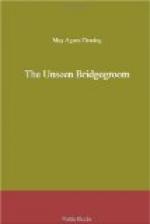“I wonder you never take it into your head to go back upon the stage. You liked that life?”
“Liked it? Yes: and I will, too,” said Mollie, recklessly, “some day, when I’m more than usually aggravated. It strikes me, however, I should like to find out my husband first.”
“Finish your story. You married this masked man?”
“Yes; that very night, about midnight, we were married. Sarah came to me early in the evening, and told me to be ready, that the clergyman would be there, and that I was to be wedded under my Christian name, Mary, alone. I still wore the wedding-robes in which I was to have been made Lady Trajenna. To these a white silk mask, completely hiding my face, was added, and I was led forth by my masked bridegroom into another apartment, and stood face to face with a portly, reverend gentleman of most clerical aspect and most alarmed face. I thought he had a familiar look, but in the confusion of such a moment I could not place him. I know him now, though—it was the Reverend Raymond Rashleigh, of St. Pancras’. I’ve heard him preach dozens of times.”
“How came he to lend himself to such an irregular proceeding?”
“By force, as I did. He was carried off in much the same fashion, and scared pretty nearly out of his wits—married us to get free—like me again. At the conclusion of the ceremony, I returned with Sarah to the inner room, and the Reverend Mr. Rashleigh was safely taken home.”
There was a pause. Mollie sat looking with knitted brows into the fire.
“Well?” questioned Miriam, sharply.
“I stayed there a week,” went on Mollie, hurriedly. “It was part of the compact, and if he was to keep his, and liberate me, I was to remain quietly as long as I had promised. But it was not so long in passing. I had the range of two or three rooms—all with carefully closed blinds, however—and I had a piano and plenty of books, and as much of Miss Sarah Grant’s society as I chose. There was nothing to be got out of her, however, and I tried hard enough, goodness knows. You might as well wring a dry sponge.”
“And the man you married?”
“Oh, he was there, too—off and on everyday; but he kept me as much in the dark as Sarah. He always persisted in speaking French to me—that I might fail to recognize his voice, I dare say; and he spoke it as fluently as a Frenchman. But he was really an agreeable companion, could talk about everything I liked to talk about, could play the piano to a charm, and I should have liked him immensely if he had not been my husband, and if he had not worn that odious mask. Do you know, Miriam,” flashing a sudden look up, “if he had taken off that mask, and showed me the handsome face of one of my rejected suitors I did not absolutely abhor, I think I should have consented to stay with him always. He was so nice to talk to, and I liked his bold stroke for a wife—so much in the ‘Dare-Devil Dick’ style. But I would have been torn to pieces before I’d have dropped a hint to that effect.”




